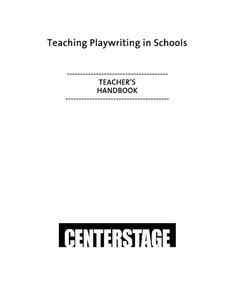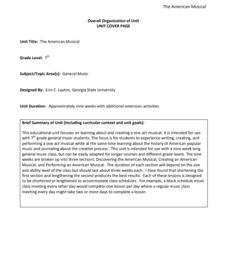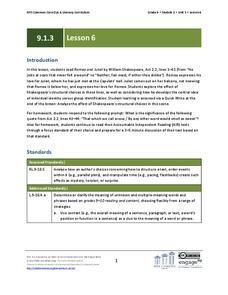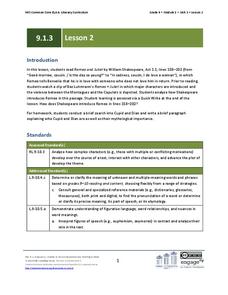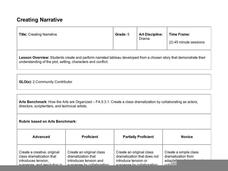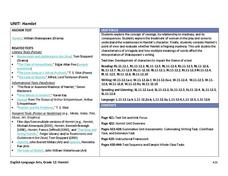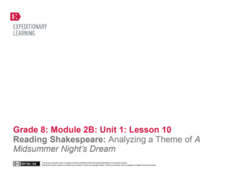Learning to Give
Teaching Playwriting in Schools
The world is a stage, and so is your classroom! Hone the skills of the next generation of Tony® award winners with a set of exercises, reference pages, writing prompts, and excerpts from famous plays.
Student Achievement Partners
"The Glorious Whitewasher" from The Adventures of Tom Sawyer by Mark Twain with Mini-Assessment
It's the classic scene: Tom Sawyer is whitewashing a fence. Expose your learners to Mark Twain's humor while reinforcing reading comprehension. Eighth graders are encouraged to read and reread, achieving as much exposure to the text...
Johnny Mercer Foundation
The American Musical
General music students learn about the history of popular American music by creating and performing a one-act musical. After researching and creating an American Musical timeline, class members write a song with lyrics using Jam Studio,...
PBS
Act of Duty
PBS provides educators with this "Utilization Guide," a four segment program that covers the Civil War, World War I, World War II, the Korean conflict, Vietnam, and the Gulf War. The 42-page packet includes lessons, background...
Star Wars in the Classroom
"Shakespeare and Star Wars": Lesson Plan Day 11
Class members take center stage as groups perform scenes from Ian Doescher's William Shakespeare's Star Wars: Verily, A New Hope. Actors are encouraged to add stage directions to the script, as well as create costumes and props to...
PBS
Supernatural Shakespeare and Macbeth
"A drum, a drum! Macbeth doth come." The withered and wild witches of Shakespeare’s Scottish play launch an examination of the fantastical elements in Act I, scene iii, paying particular attention to the action, imagery,...
EngageNY
Grade 9 ELA Module 1: Unit 3, Lesson 6
The balcony scene from Romeo and Juliet takes center stage as class members consider the structural choices Shakespeare makes, i.e., having Romeo appear first in the scene and having Juliet appear unaware that Romeo is listening to her...
EngageNY
Grade 9 ELA Module 1: Unit 3, Lesson 2
After viewing a clip from Baz Luhrmann’s Romeo + Juliet in which major characters are introduced, and the violence between the Montagues and the Capulets is depicted, the class reads Act 1, Scene 1, lines 158-202. Groups then analyze the...
EngageNY
Grade 9 ELA Module 1: Unit 3, Lesson 5
Class members continue their study of Romeo and Juliet by watching scenes from Baz Luhrmann’s Romeo + Juliet and then examining the figurative language Shakespeare uses in Act 1, scene 5, lines 92–109 when Romeo and Juliet meet at the ball.
EngageNY
Grade 9 ELA Module 1: Unit 3, Lesson 13
Readers examine the conversation between Friar Laurence and Romeo in Act 3, scene 3 of Romeo and Juliet and consider how Shakespeare's word choices impact the development of Romeo's character.
Hawaiʻi State Department of Education
Creating Narrative
Plot, setting, characters, and conflict are common to both drama and narrative stories. Kids create narrated tableaus that show their understanding of the plot, setting, and conflict of a story they've recently read. The lesson...
Penguin Books
A Teacher's Guide to the Signet Classics Edition of Macbeth by William Shakespeare
Double, double scholars' appreciation of the Scottish Play with a guide that adds a rich brew of pre-reading background information, chapter discussion questions, activities, and writing prompts to provide readers with a "firm and good"...
EngageNY
Grade 9 ELA Module 1: Unit 3, Lesson 10
"O, I am fortune's fool!" As they continue their analysis of Act 3, scene 1, class members consider the role of fate in the events. The lesson concludes with a viewing of a brief portion of Baz Luhrmann’s Romeo + Juliet, in which the...
Louisiana Department of Education
Unit: Hamlet
Encourage readers to determine if Hamlet's madness is actually divinest sense. Class members analyze the words of the play before studying related texts, including T.S. Eliot's "The Love Song of J. Alfred Prufrock," scenes from...
Curated OER
Ancient Greece Podcast
In this writing a podcast lesson plan, 7th graders create a podcast involving Ancient Greece. Middle schoolers follow a rubric and outline to create their podcast. Students present their podcast to their fellow middle schoolers.
Shakespeare Uncovered
Suits of Woe: Grief and Loss in Hamlet
“Thou know’st ‘tis common; all that lives must die/Passing through nature to eternity.” Grief, and the response to grief and loss, is the focus of a series of activities that uses Hamlet as a launchpad. Groups examine Act I, scene ii to...
Generation Rx
My Generation Rx: Plot Twists
How can prescription drugs be dangerous if they were prescribed by a doctor? Is it okay to share your prescription drugs with friends if they really need them? Clear up any common misconceptions about prescription drugs with a set of...
Roald Dahl
Matilda - The Platinum-Blond Man
Before reading Chapter Six, "The Platinum-Blond Man" in Matilda, readers preview the illustration of Mrs. Wormwood dropping her plate of food, and think about what may have happened to cause the scene. After reading the chapter, class...
Curated OER
Shakespeare 2000
Young thespians can try their hand at writing a script and acting out a scene, while gaining a deeper understanding of the universal topics presented in Shakespeare's wide array of plays. Begin the lesson by conducting a compare and...
EngageNY
Grade 9 ELA Module 1: Unit 3, Lesson 11
The study of Romeo and Juliet continues as pairs use the provided summary tool worksheet to record evidence of how Shakespeare uses dramatic irony to heighten the tension in Juliet's soliloquy in Act 3, scene 2, lines 1–31.
EngageNY
Grade 9 ELA Module 1: Unit 3, Lesson 9
After viewing Baz Luhrmann’s depiction of Romeo and Juliet's marriage, the class listens to a recording of Act 3, Scene 1, lines 59–110. Then, groups consider how Shakespeare develops Romeo’s character through his interactions with...
EngageNY
Grade 9 ELA Module 1: Unit 3, Lesson 14
After watching the scene from Romeo + Juliet in which Juliet argues with her parents because she does not want to marry Paris, groups do a close reading of Act 4, scene 1, lines 44-88, examining the word choices in the conversation...
EngageNY
Grade 9 ELA Module 1: Unit 3, Lesson 17
Romeo and Juliet, Act 5, Scene 3, lines 139-170, is the focus of this day's lesson plan. Readers examine the dramatic irony in Juliet's comments and consider how "lamentable chance" caused by a "greater power" plays a role in the tragedy.
EngageNY
Reading Shakespeare: Analyzing a Theme of A Midsummer Night’s Dream
After finishing Act I, scene 1 from Shakespeare's A Midsummer Night's Dream, class members study the theme of control as it relates to the play and start an Evidence of Control note-catcher worksheet.
